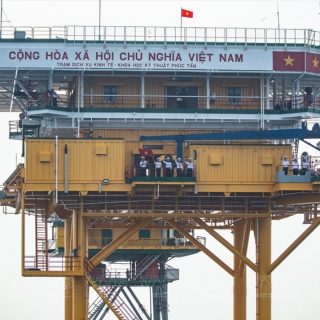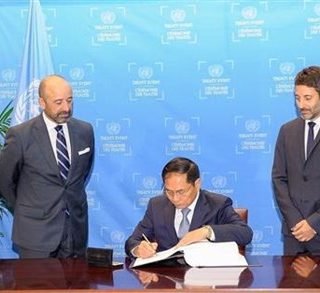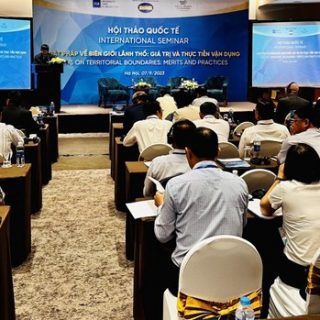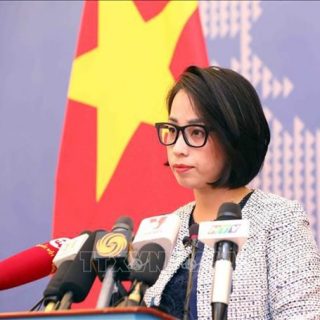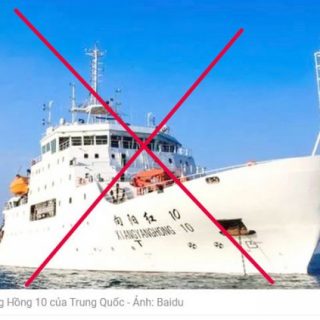
The event was attended by nearly 200 delegates from ministries and sectors, foreign ambassadors, representatives of diplomatic corps in Hanoi, along with more than 100 others from 22 members of the ASEAN Regional Forum (ARF) who took part in the ARF workshop on implementing the UNCLOS and other international instruments to address emerging maritime issues in Hanoi on November 13-14.
The UNCLOS was adopted on December 10, 1982 and took effect on November 16, 1994. Vietnam was one of the first 107 countries to sign and ratify this convention.
In its ratification resolution, the Vietnamese National Assembly affirmed that by ratifying the treaty, the country shows the determination to join hands with the international community to build an equitable order and encourage the development and cooperation at sea.
Addressing the ceremony, Deputy Foreign Minister Nguyen Quoc Dung underlined that seas and oceans make up over 70 percent of the earth’s surface. They not only connect continents but are also sources of livelihoods and the space for activities and interaction among more than 200 countries around the globe, he said.
Dung noted the building of a legal document to resolve all issues relating to the law of the sea and to establish a legal order for the seas and oceans are vital and also the aspiration of all nations as shown in the preamble of the UNCLOS.
With 320 articles and nine annexes that cover all activities on the seas and oceans, the UNCLOS is considered a constitution for the seas and oceans and serves as the legal foundation for all sea-related activities at the national, regional and global levels, Dung said, adding that 168 countries have joined this convention so far, and almost all regulations in this treaty have become international practices.
According to the official, the UNCLOS has become a solid international legal basis to define rights, obligations and responsibilities of coastal countries, and to deal with issues related to the seas and oceans.
Dung said over the last 25 years, Vietnam has always respected the guidelines and objectives of the UNCLOS while making efforts to enforce the convention in the East Sea.
The country has aligned its legal system on the management and use of the sea, especially the 2012 Law of the Sea, with the UNCLOS. Besides, it has persistently handled sea-related differences by peaceful means and in line with international law, including the UNCLOS.
Under this policy, Vietnam has held negotiations on and signed treaties on maritime delimitation with neighbouring countries like Thailand, China and Indonesia. It is also actively promoting the talks on the delimitation of the sea area beyond the mouth of the Gulf of Tonkin with China, the delimitation of the exclusive economic zone with Indonesia, and the maritime delimitation with other neighbours, he said.
Dung added the country has stepped up maritime cooperation in a diverse and increasingly substantive manner so as to optimise the sea’s potential and deal with emerging challenges and create a peaceful and stable environment in the East Sea.
The Deputy Minister pointed out many recent complex developments in the East Sea that seriously violated the rights of Vietnam and other regional countries which were stipulated in the UNCLOS.
Vietnam has persistently respected and fully complied with the UNCLOS, respected the diplomatic and legal processes, and not wrongly interpreted or intentionally played down the significance and role of the convention, he stressed, adding that when there are any differences relating to the interpretation and application of the UNCLOS, the concerned parties need to solve those issues via negotiations or other peaceful measures in line with international law, including the UNCLOS.
When differences haven’t been handled, the relevant parties need to respect and fully implement the 2002 Declaration on the Conduct of Parties in the East Sea (DOC); exercise self-restraint; not take unilateral actions that may complicate the situation, elevate tensions or jeopardise regional peace and stability; and take part in negotiations in a constructively manner so as to soon finalise an efficient and practical Code of Conduct in the East Sea (COC) that is in conformity with the UNCLOS, Dung emphasised./.

Aufrufe: 477

 Deutsch
Deutsch Tiếng Việt
Tiếng Việt
